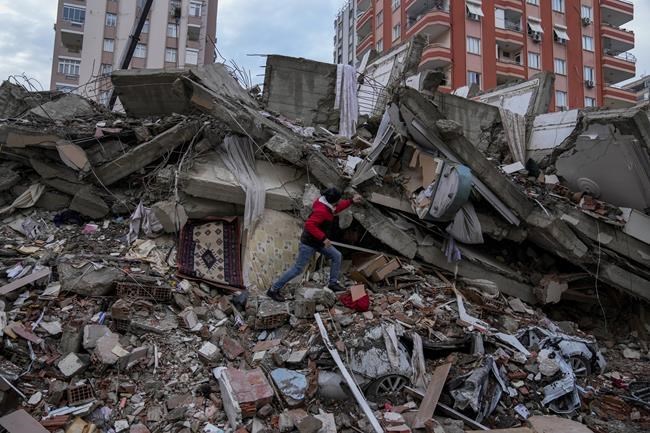Canada is ready to help in the aftermath of a disastrous earthquake that hit Turkey and Syria, Prime Minister Justin Trudeau said Monday, as authorities in those countries reported that more than4,000 people had died and thousands more were injured.
Rescue workers and residents searched the rubble of toppled buildings for survivors and officials feared the death toll would keep climbing.
Residents immediately rushed outside in rain and snow to escape falling debris, while those who were trapped cried for help. Throughout the day, major aftershocks hit. At night, workers were still pulling out bodies as desperate families waited for news on trapped loved ones.
Trudeau said the reports and images from Turkey and Syria were "devastating."
"Canada stands ready to provide assistance," he said in a statement. "Our thoughts are with everyone affected by these major earthquakes, and our hearts go out to those who lost loved ones."
Trudeau told question period that the government is trying to determine "how it can best help in the short-term, knowing there will also be need for support in the long-term as communities rebuild from this terrible event."
Ibrahim Cinaroglu, a member of the Turkish-Canadian Society, said four of his friends and their family members were among those killed in Turkey.
"We couldn't reach them unfortunately through the phone or any other means, but we heard that they (have) died," he said.
Cinaroglu said it's mentally crushing.
"How can that happen to you or your beloved ones?" he said. "It is terrible right now."
Cinaroglu called on the Canadian government and people to help.
Global Affairs Canada said in a statement that it is monitoring the situation and is in close contact with its humanitarian partners.
"We are assessing needs on the ground and stand ready to provide assistance."
It said it has not yet received any requests for help from Canadians related to the earthquakes but noted there are 7,513 who are registered as being abroad in Turkey and 1,394 in Syria.
The federal Conservatives would support "any effort by Canadians and the Canadian government to provide assistance," foreign affairs critic MP Michael Chong said in a tweet.
NDP foreign affairs critic MP Heather McPherson urged the federal Liberal government to send immediate humanitarian support.
The quake, which was centred on Turkey's southeastern province of Kahramanmaras, piled more misery on a region shaped on both sides of the border by more than a decade of civil war in Syria.
Thousands of buildings were reported collapsed in a wide area extending from Syria's cities of Aleppo and Hama to Turkey's Diyarbakir, more than 330 kilometres to the northeast.
More than a dozen Canadian aid agencies working together as the Humanitarian Coalition said they are raising funds to rush assistance to people in need.
Moutaz Adham, the Syria country director for Oxfam Canada, said the number of people killed and injured was shifting rapidly.
"We are seeing families are looking for their missing loved ones who (are) left under the debris of collapsed buildings. We know that people, even those that their buildings haven't collapsed, don't feel safe to go back,” he said in a phone interview from Damascus.
"The earthquake is coming on top of a very dire humanitarian situation in Syria."
The United Nations estimates that some 6.9 million people are internally displaced inside Syria due to the war.
Majd Khalaf, a Montreal-based co-ordinator with the White Helmets, a Syrian civil-defence organization, said many buildings that collapsed had been damaged during the war, making them more vulnerable to the quake.
"Our teams are now responding … they are digging in the rubble to save lives," he said. "It's really a huge disaster."
Vast areas in northwest Syria have lost power and internet connections, he added.
Khaled Abdulwahed, a Toronto-based manager with Molham Volunteering Team, a non-profit organization that provides aid to displaced people in Syria, said his organization has also started a fundraising campaign to support those who lost their homes.
He said there's a high demand for essentials, including food, infant formula, heaters and blankets, for people who are sheltering in schools, sport centres and mosques.
"Our teams are also supporting hospitals and medical centres with medical supplies," he said.
The U.S. Geological Survey measured Monday's quake at 7.8, with a depth of 18 kilometres. Hours later, a 7.5 magnitude quake struck more than 100 kilometres away. The second jolt was considered an aftershock because it took place on the same fault line as the first, according to a USGS seismologist.
The region in Turkey hit by the earthquake sits on top of major fault lines and is frequently shaken by earthquakes. Some 18,000 people were killed in similarly powerful earthquakes that hit northwest Turkey in 1999.
Offers of help, from search-and-rescue teams to medical supplies and money, have poured in from dozens of countries, as well as the European Union and NATO. The vast majority were for Turkey, with Russian and Israeli promises of help to the Syrian government, but it was not clear if any would go to the devastated rebel-held pocket in the northwest.
— With files from Jordan Omstead, Dylan Robertson and The Associated Press
This report by The Canadian Press was first published Feb. 6, 2023.
Maan Alhmidi and Sharif Hassan, The Canadian Press




